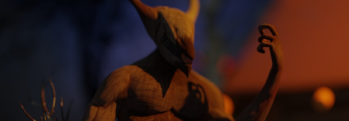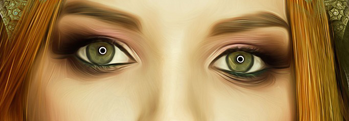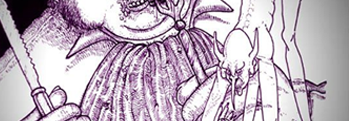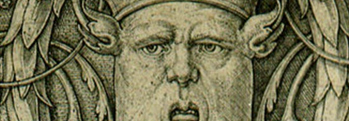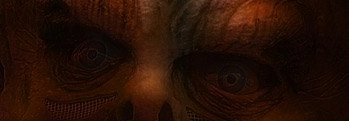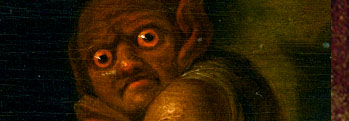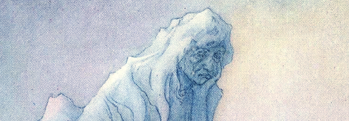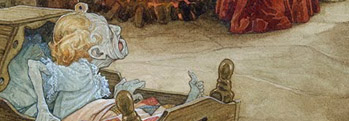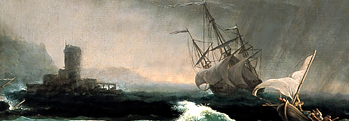Changelings
Irish and Celtic myths and legends, Irish folklore and Irish fairy tales from Irish Gods and Monsters
Changelings, thieves of the young and the fair
While most people nowadays believe fairies to be gentle creatures, prone to mischief perhaps and capricious by their natures yet well intended for all that, in Ireland they have a more sinister reputation. Some say, and some still believe, that the fairies will take small children and young people, leaving in their place creatures known as changelings or Sibhreach, or other names which will not be spoken here!
 Often a baby might become ill, or take on a strange appearance, or a person might be left unable to move their limbs, fairy-struck as they called it, and the local people would begin to suspect fairy work.
Often a baby might become ill, or take on a strange appearance, or a person might be left unable to move their limbs, fairy-struck as they called it, and the local people would begin to suspect fairy work.
And it didn't stop with that – the family under whose roof a changeling dwelt would have no luck from that day forward, but still they must care for and love the changeling if they ever wanted to see their own child again! For the fairies would treat their hostage in the same manner or worse.
Babies are most at risk, although the Sidhe fear nothing more than iron and fire, so a pair of scissors or tongs may be left near to the crib, or the crib left close to a fireplace, and draping a garment belonging to the father of the child over the baby as it sleeps is also said to be a preventative.
Sometimes they won't even leave one of their own behind but rather a lump of wood or bundle of twigs called a stock, enchanted to seem like a baby, which will sicken and die before its parents eyes!
But what, you may ask, will the fairies do with abducted children? And well you may ask but the truth is nobody knows. Some say they are offered to dark powers once every seven years in exchange for freedom to walk the earth, others that fairies need new blood from sturdy humans to keep their lines strong – even with all their carousing they don't have many young, and birth is difficult for them – and yet others that changelings are old fairies, near to death, and the children are meant to take their place.
Looking upon a baby with envy, called “overlooking the baby” is frowned upon in Ireland unless it is also accompanied by a blessing and a prayer, for such a gaze may also draw the attention of less kindly eyes.
Babies alone were not in peril from the fairies mind you, any young gentleman or maiden, fair of form and sound of mind and body was at risk, for the wee folk crave beauty with the jealousy of a lover. Although tales do tell of the odd individual who voluntarily went went them, and returned years later with a gift, whether that be an understanding of herbs or some other more eldritch knowledge.
The signs by which the old folk knew a changeling were several, but mainly a change in demeanour was noted, from happy to sullen, and a wizened appearance came upon the person, and an appetite that grew while they lost weight. Innocence would fade from their eyes to be replaced with darkness and a shifty look.
So great is the love of music among the fairies that leaving an instrument near a crib and listening for a virtuoso performance was a good way to confirm any suspicions.
Changelings were crafty sorts as well so you had to have your thinking cap on when dealing with them. One young mother by the name of Maureen Doherty felt something was amiss with her child, so she went to consult with a wise man, a storyteller who lived several miles away.
When she returned, taking his advice, she emptied out the yolks from several eggs and filled them with water, seeing out of the corner of her eyes that the babe watched her every move closely.
“What are you about, ma?” asked the baby.
Her heart lurched in her bosom then for what child could speak at that age.
“I'm brewing, my lovely child,” she said hoarsely, placing the eggshells in the fire.
“What's that you're brewing then, mother,” said the babe, craning out of its crib with narrowed eyes.
“Why eggshells of course,” she replied, upon which the child burst out in a great gust of dry high laughter, like an old man who's seen a dancing chicken wearing a bow tie.
“My eyes have seen the burning of Rome and London, but they haven't yet seen the likes of this!” the creature cackled, and Maureen turned with her heavy iron ladle in hand, raised as if to strike, and rushed at the crib! But she tripped over and hit her head, awaking to find the changeling gone and her son back safe and sound.
Not all stories end so happily of course, there are as many ways to restore a lost child or person as there are tales of their stealing. Some say a dunking in foxglove water will do the trick, while others advise waiting outside the nearest fairy mound for when they go a-trooping, which they do several times a year. If you know the right words, you can give them back their own.
Feeding the person the first milk of a cow after calving, supposed to be like ambrosia to the fairies, was meant to return the original to their rightful place.
Fairies are terrified of fire, so holding a burning brand next to the mouth of one suspected of being a changeling and asking their true names three times may drive them forth. Readers, it shouldn't need saying, I am sure know that much of this was before our modern understanding of afflictions both of the mind and body, and not make the mistake of Michael Cleary of Tipperary, who burned his wife to death in 1895 under the foolish belief that she was a changeling. He served fifteen years in prison and fled the country upon his release.
If after all a changeling is left unaccounted for, they may grow up to become a person slow of wits and of poor manners, what was called an ouphe or oaf, while their human counterparts either pined away under the hill or lived quite happily among the dancing folk.
“The summer sun was sinking
With a mild light, calm and mellow,
It shone on my little boy's bonny cheeks,
And his loose locks of yellow.
The robin was singing sweetly,
And his song was sad and tender;
And my little boy's eyes as he heard the song,
Smiled with sweet soft splendour.
My little boy lay on my bosom,
While his soul the song was quaffing;
The joy of his soul had ting'd his cheek,
And his heart and his eye were laughing.
I sat alone in my cottage,
The midnight needle plying;
I fear'd for my child, for the rush's light
In the socket now was dying.
There came a hand to my lonely latch,
Like the wind at midnight moaning,
I knelt to pray--but rose again--
For I heard my little boy groaning!
I crossed my brow, and I crossed my breast,
But that night my child departed!
They left a weakling in his stead,
And I am broken-hearted!
Oh! it cannot be my own sweet boy,
For his eyes are dim and hollow,
My little boy is gone to God,
And his mother soon will follow.
The dirge for the dead will be sung for me,
And the mass be chaunted sweetly;
And I will sleep with my little boy,
In the moonlight church-yard meetly.”
A man in the village of Dowra claims to have been taken and returned, and you can find the little village on the map below.
More Irish Gods and Monsters
The Irish elk, or more properly deer, was the single largest species of deer which has ever existed. They were slightly larger than the modern moose, but their spread of antlers was vast - up to four meters or thirteen feet across in some specimens! These magnificent creatures roamed the plains and forests of Ireland and Europe before, during and a ... [more]
It was a fine day in Ireland many years ago when Fionn and his Fianna took a fancy to go out hunting. Warm was the sun amid the whispering glades of ancient forests, gentle was the breeze and sweet the scent of summer flowers in its bosom. Sweeter yet was the sight of a mighty deer to the eyes of the hunters, and so they gave chase, howling with de ... [more]
It is during the darkest winter nights that we sit inside our houses and listen to the wind hammering at our windows and doors, as if it had a mind and will of its own – as if it wished to do us harm! The old people of Ireland believed that was the literal truth, that there were demons of the air, or demna aeóir thronging about the ... [more]
No tale of ancient Ireland could be complete without mentioning the Fomorians, dreaded foes of the Tuatha Dé Danann and all who came to conquer Ireland. The meaning of their name is debated even today, although most agree that the first part, fó, means “from below” or “nether” and the latter part means “t ... [more]
The dragons of Ireland were not like the dragons of other places, since they did not have wings or often even claws, and only rarely did they breathe fire, if at all! The were called the Ollphéisteanna, which means “great worms” or “mighty reptiles”, the terrible serpents of the world that was. The greatest among t ... [more]
It's well known that the people of Ireland are gifted in poetry, music, writing and the arts, and many have to come to these shores to admire these works. But there is one who moves through the misty glens and dappled glades of Ireland and it is the poets who whisper to her in the darkest hours of the night, hoping for an answer! This fairy ... [more]
In Ireland of old, the Alp-Luachra was one of the most dreaded of all the fairy folk. It also went by the name of Joint-eater, Just-halver, Art-Luachra, Airc-Luachra, and Doichi-Luachair. This creature made its abode in Irish streams and rivers and any place where green life grew from water. Outside of a person it was not much to look at, being ... [more]
Among all the fairy folk who wander the mists and glimmerings of Irish folklore, there are few as feared as the Fear Gorta, whose name means “the Hungry Man”. When hunger stalks the land, it does so as a hound following the footsteps of the Fear Gorta, a solitary, gaunt and masterless spirit of emaciated appearance. Now this fairy is ... [more]
One of the great terrors of ancient – and not so ancient! – Ireland was the Cú Sidhe, or the hound of the Sidhe. This monstrous beast was known in all of the lands once ruled by the Gael, being called the cù-sìth in Scotland and the Cŵn Annwn in Wales. They were also known as the Coinn Iotair, Hounds of Rage, whi ... [more]
A name which echoes through many ancient Irish myths and legends is that of the spirit of the oceans, Manannán mac Lir. Was he a Gaelic god and father of gods, a powerful king of old, first among the Tuatha De Danann, a title for a cult of secretive mystics or a Lord of the Otherworld? Perhaps all of these and more, or none. The earliest ... [more]
Across the northern parts of Ireland and Scotland people sometimes whisper of a terrifying spirit that can sometimes be seen before a big storm hits, the one they call the Storm Hag, or the Cailleach. She is known as the queen of winter, and her destructive power is most often witnessed at the end of winter, when her power is fading. The people ... [more]
Whispered across misty ages from times long gone are stories of the Cailleach, one of the ancient goddesses of the first people to walk in Ireland, queen of the mighty glaciers that once clenched the land in their frozen grip. Many tales are told of the old hag, but fewer speak of her consort, the Bodach! His name means “the old man” ... [more]
When Saint Patrick banished the serpents from Ireland, there was one who was overlooked, perhaps because he slumbered or was abroad himself, and that one was called Lig na Paiste, or the “Last Great Reptile”. Soon after Saint Patrick passed away, he made his presence known as he was known of old to the people of Owenreagh! A giant se ... [more]
Throughout the lands where Gaelic was spoken, the legend of the water horse was whispered by many a fireside, or sometimes told in a hurry by someone running the other direction! There are many lakes in Ireland, and most of them aren't very large, but they run still, dark and deep. The Each-Uisce, as the water horse or horse-eel was known in ... [more]
Of all the different kinds of goblins that haunted the lonely places of Ireland in days of old, air-demons were most dreaded by the people. They lived among clouds, and mists, and rocks, and they hated the human race with the utmost malignity. In those times lived in the north of Desmond (the present county of Cork) a man man named Fergus O'Mar ... [more]
In many cultures those that used to be called insane held a special place of reverence, and were treated almost as envoys from another place, or as though they could see something nobody else could, or were dancing to music only they could hear and the rest of us were deaf to. From far-off India and China to more familiar shores people would doff t ... [more]
Ancient Ireland was said by some to have been plagued by a particularly large and fierce breed of wolf, and men would sometimes go to war with them, or call them to war alongside heroes and champions! They would even make so bold as to attack villages and towns, and a great pack of them assailed Coleraine in the year 1650. To battle these fierce ... [more]
An Cailleach or the veiled woman is among the most ancient deities venerated in Ireland, she whose realm lies in the ice and cold of winter. Once it was said that she ruled all the world, when the green things slept for untold aeons beneath her thick icy cloak, until she was given cause for great sorrow and wept floods of tears across the land, her ... [more]
The raven has long been an omen of ill-tidings around the world, bearer of bad news and warnings, but in Ireland it was known once as a servant of the fairy Morrigan, or the raven was herself in person! She it was whose name meant the Great or Ghost Queen, from the old words for fear and greatness. Some will tell you earnestly that she was a god ... [more]
While most people nowadays believe fairies to be gentle creatures, prone to mischief perhaps and capricious by their natures yet well intended for all that, in Ireland they have a more sinister reputation. Some say, and some still believe, that the fairies will take small children and young people, leaving in their place creatures known as changeli ... [more]
They do say that good things come in small parcels, but often forget to add that not all small parcels are filled with good things! And so it was in the little village of Slaughtaverty in the distant past, ruled as it was by a fearsome dwarf-tyrant known as Abhartach. Stature and size were much prized in ancient Ireland, as well they might be fo ... [more]
In ancient times, even before the Tuatha De Dannan and the Fir Bolg went to war over the green land of Ireland, the land was ruled by a powerful sorcerous race called the Fomors. Warped and strange they were in appearance, some say dark of skin while others claim they dwelt at the bottom of deep lakes and in the turbulent depths of the ocean' ... [more]
The Pooka or Puca is one of the most ancient fairy creatures of Ireland, and is known further abroad as well, called Puck or Pook. In some places he is feared and in others respected. He can take many shapes, most commonly that of a wild horse wrapped in chains with sulfurous or blazing crimson eyes - the night mare - a huge dog, a raging bull, a h ... [more]
The Banshee or woman of the fairy folk as she is known in Ireland has many names, the Little Washerwoman, Hag of the Mist and the Hag of the Black Head. She takes three forms, that of a young and comely maiden, a matron of full and generous figure, or that of a wretched old crone, and is dressed in red or white or as the occasion calls for it, in t ... [more]
Crom Cruach was one of the old gods of Ireland, one of the few mentioned as a god in the Annals of the Four Masters, an ancient Irish codex telling of the times before Christianity came to Ireland. His name may have many meanings, but he was most commonly known to the people as Crom Dubh, or the crouching darkness. His worshippers are said to have ... [more]
Old Jack Doherty was a kindly and good natured sort of fellow, as well he might be for he had chosen to live in a strange and desolate part of the country, by a coast of jagged rocks and sucking tides. And why might that be cause for merriment, you may ask? Well, it was many's the night and many's the storm that blew an unfortunate ship too ... [more]
Of all the wonders and terrors in Irish folklore there are few quite so terrifying as the Sluagh. Tales were told of their wild hunt long before the coming of Christianity to Ireland, and even today old folk in the countryside will keep the windows on the west side of the house fastened tight at all times, but most especially during wakes or if som ... [more]
The Red Thirst, the Dearg Due, was these thousand years gone by a young maiden of surpassing fairness. Bards sang songs of her skin as fair as springtime snow and her lips as red as rubies in the light of the setting sun, men came from far and wide to seek her hand in marriage. And yet pretty as she was, her true beauty shone from within, as kindly ... [more]






